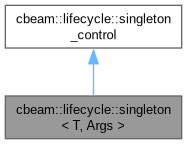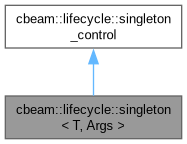Loading...
Searching...
No Matches
Public Member Functions |
Static Public Member Functions |
Protected Member Functions |
List of all members
cbeam::lifecycle::singleton< T, Args > Class Template Reference
#include <singleton.hpp>
Inheritance diagram for cbeam::lifecycle::singleton< T, Args >:

Collaboration diagram for cbeam::lifecycle::singleton< T, Args >:

Public Member Functions | |
| singleton (private_construction_tag, const std::string &name, Args... args) | |
| Internal constructor. Use get() to create a new instance. | |
| ~singleton () noexcept override | |
 Public Member Functions inherited from cbeam::lifecycle::singleton_control Public Member Functions inherited from cbeam::lifecycle::singleton_control | |
| virtual | ~singleton_control ()=default |
Static Public Member Functions | |
| static std::shared_ptr< T > | get (const std::string &name, Args... args) |
| Retrieves (or creates) the shared instance of type T by name. | |
| static void | release (const std::string &name) |
| Explicitly removes the named singleton instance from the global map. | |
 Static Public Member Functions inherited from cbeam::lifecycle::singleton_control Static Public Member Functions inherited from cbeam::lifecycle::singleton_control | |
| static void | reset () |
| Resets (shuts down) all stored singleton instances. | |
| static void | set_operational () |
| Ends the shut-down state and allows singletons to be created again. | |
Protected Member Functions | |
| void | release_instance () override |
Called by singleton_control::reset() to release the managed resource. | |
Additional Inherited Members | |
 Static Protected Attributes inherited from cbeam::lifecycle::singleton_control Static Protected Attributes inherited from cbeam::lifecycle::singleton_control | |
| static std::map< std::string, std::unique_ptr< singleton_control > > | _instances |
| static std::mutex | _mutex |
| static bool | _shutdown {false} |
Constructor & Destructor Documentation
◆ singleton()
template<typename T, typename... Args>
|
inline |
Internal constructor. Use get() to create a new instance.
◆ ~singleton()
template<typename T, typename... Args>
|
inlineoverridenoexcept |
Member Function Documentation
◆ get()
template<typename T, typename... Args>
|
inlinestatic |
Retrieves (or creates) the shared instance of type T by name.
If _shutdown is true, returns nullptr immediately. Otherwise, it either returns the existing instance (if present) or creates a new one.
- Parameters
-
name Unique name for the resource. args Forwarded constructor arguments for T if a new instance is created.
- Returns
- A
std::shared_ptr<T>to the managed resource, ornullptrif shut down.
- Exceptions
-
cbeam::error::runtime_error if a type conflict arises (rare).
◆ release()
template<typename T, typename... Args>
|
inlinestatic |
Explicitly removes the named singleton instance from the global map.
If you need a full reset of all singletons, use singleton_control::reset().
- Parameters
-
name Name of the resource to remove.
◆ release_instance()
template<typename T, typename... Args>
|
inlineoverrideprotectedvirtual |
Called by singleton_control::reset() to release the managed resource.
Implements cbeam::lifecycle::singleton_control.
The documentation for this class was generated from the following file:
- include/cbeam/lifecycle/singleton.hpp